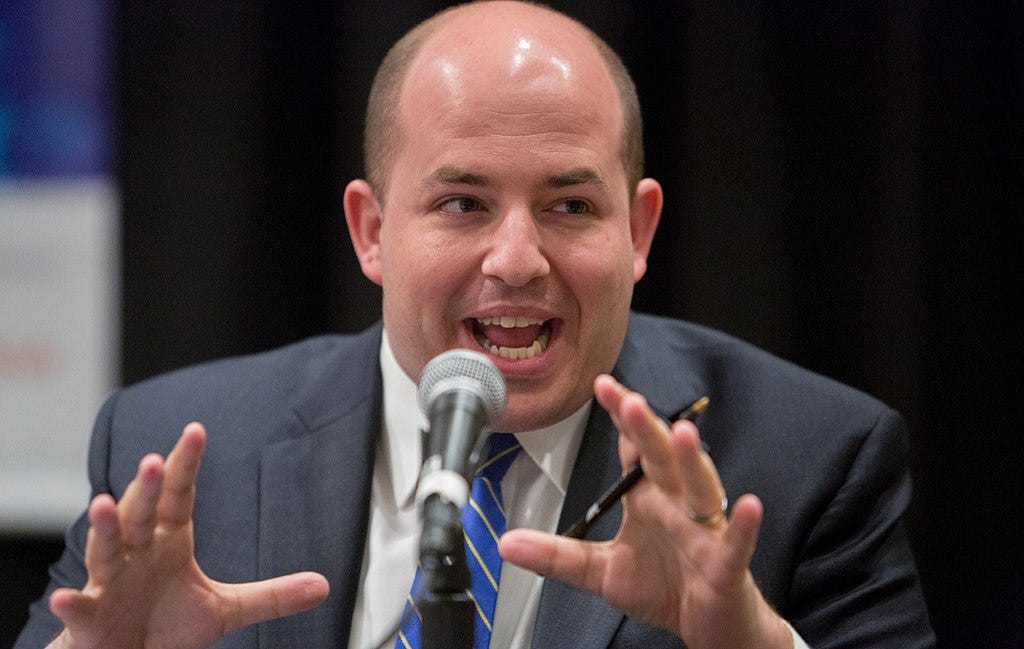What Brian Stelter's Firing Says about Media
For the first time in a long time, the media is looking to give customers what they want.
Image: nrkbeta, CC BY-SA 2.0 <https://creativecommons.org/licenses/by-sa/2.0>, via Wikimedia Commons
Brian Stelter is the latest celebrity journalist whose firing has made national news. NPR broke the story, which then traveled widely across the web, followed by a glut of schadenfreude from the right, and some lament on the left. "Stelter came to CNN from the New York Times as the nation's top media reporter. He departs CNN an impeccable broadcaster," a CNN executive said.
But unlike Stelter’s former colleague, Jeffrey Toobin, who was also fired from CNN this week after returning from a scandal-related leave of absence, the Stelter news signals the start of a potential shift in media with significant implications for not just the industry, but American culture and society.
Despite the dismal ratings of his show, “Reliable Sources,” (which drew only a fraction of Fox’s media program, “Media Buzz”) Stelter was a genuinely significant presence on the network.
He was—and still is—a symbol for both sides of the pitched political battle playing out in the press. For the left, he’s a truthsayer boldly calling out the lies of the wicked conservative media whose black magic has entranced the country. For the right, he is a political carnival barker willing to chant any liberal narrative while ostentatiously bedecking himself in the robes of dispassionate journalism.
With his firing, however, we’re witnessing something interesting: both narratives have become less potent. Instead, Stelter’s bosses at CNN and its parent company, media conglomerate Warner Bros. Discovery, seem to be refocusing on hard audience growth, rather than personal brands and political appeal.
This marks a shift from from the past seven years, during which the rise of Trump charged the cultural atmosphere to such an extent that polarized news content was almost a sine qua non. It’s not hard to see why a news company would try grab as much of that ambient energy as it could by delivering content as politicized (and politicizing) as possible.
In this, the media succeeded. For all its handwringing about polarization, it’s difficult to think of any institution that has had as great a polarizing effect on American society. Even the fulminations of populist politicians can only have limited, local effect without the massive megaphone of media.
But the high wattage clash of Trumpism and its many opposing isms (wokeism, Never Trumpism…) has left us all fried. Yes, the bases of both sides are still buzzing. But after a pandemic, an unprecedented political crisis, and now a recession (or a not-recession, depending whom you ask), the media consuming public wants cooler heads. Most importantly, it no longer wants Truth. It wants facts. It needs quiet reporting, not shouty commentating.
This is all fairly uncontroversial. What the Stelter firing really reveals, and what makes this so interesting, is that for the first time in a long time, the mainstream media is seeking to give its customers what they want. It also signals a break in media companies’ conception of who the customer is—the consuming public or the curating elites.
Stelter was considered a great success because Twitter loved (or hated) him and journalists loved (or hated) him. But Twitter isn’t a CNN audience. It’s Twitter. And journalists might be influential, but (in more ways than one) they’re not profitable.
Ken Auletta, the great media journalist and author, put his finger on this pulse this past February, when, after the firing of former CNN boss Jeff Zucker, he told Stelter (on air): “I would be a little nervous if I was at CNN.”
This may in the end be an anomaly. But it’s unlikely. What’s more realistic is the the Stelter firing is the first sign that the media ship is slowly, and perhaps lugubriously, turning itself around.





Stelter was a leftist hack, a myrmidon of the Democrat party. CNN is hopeless and will never change because its infected with the same neo Bolshevik disease from which our once untouchable Federal agencies suffer.